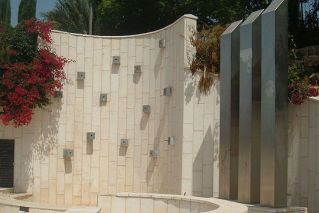 Monument commemorating those who died in October 2010
Monument commemorating those who died in October 2010In a letter sent two weeks ago (28 August 2011) to Prime Minister Binyamin Netanyahu and others, Adalah and the Association for Civil Rights in Israel (ACRI) demanded that the Israeli authorities adopt an appropriate policy and issue proper directives to the police for dealing with potential protests by Palestinian Arab citizens of Israel in September 2011, in the aftermath of the anticipated vote in the UN General Assembly on recognition for a Palestinian state.
In the wake of numerous media reports of preparations being made by the police in anticipation of major protests that may occur in Israel in September, Adalah and ACRI demand that the Israeli police and security services do not treat Arab citizens of Israel who exercise their right to demonstrate as enemies of the state. This demand comes in light of the bitter experience of police conduct towards protests and demonstrations by Palestinians in Israel, first and foremost in October 2000 in which 13 Arab citizens were killed by police fire. The police must put in place a clear policy of allowing Arab citizens to exercise their right to protest and voice their opinion on an equal basis with other citizens of Israel, in accordance with the recommendations and lessons learned from prior events, and in particular the recommendations of the Or Commission of Inquiry in 2003.
The Or Commission, which investigated the way in which the Israeli police dealt with public protests in October 2000, found that, “It is important that police officers of all ranks internalize the importance of dealing with the Arab sector in a balanced and moderate way […] The police must instill an understanding among its police officers that the Arab general public is not their enemy and should not be treated as an enemy.” ccordingly, ACRI and Adalah demand that the security forces implement the Or Commission’s recommendations and categorically ban the opening of fire on unarmed demonstrators. They must also be prohibited from using lethal means against them (snipers and rubber-coated live bullets), and do their utmost to ensure that no harm comes to any demonstrator.
In the letter, Adalah Attorney Orna Kohn argued that, “The aggressive language being using by the police leadership to describe events that have not yet taken place is indicative of a hostile attitude towards Arab citizens. This attitude is prevalent throughout the police force, and affects the extent to which the police force abides by its obligation to respect Arab citizens’ freedom of expression and freedom of assembly, which had dire consequences in October 2000.”
Attorney Auni Banna, Director of ACRI’s Arab Minority Rights Department, argued that, “Palestinian citizens of Israel have the right – along with other citizens of the state – to the equally and fully exercise the right to protest without fear that they will pay for it with their lives.”







